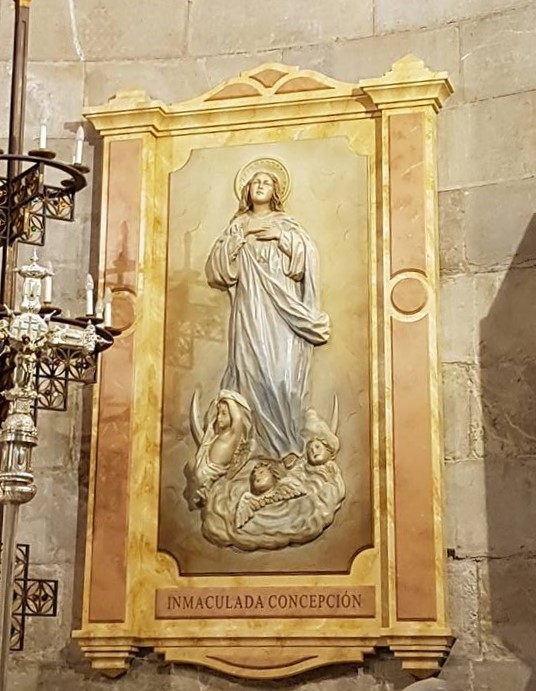FAUSTO GOMEZ OP
When I was a child, I heard these two expressions many times: “Ave Maria Purísima,” and “Sin pecado concebida.” The beggars knocked at the door of our house in our town El Oso (Ávila)while saying aloud, “Ave María Purísima” (“Hail, the most pure”). Our mother always answered: “Sin pecado concebida” (“Conceived without sin”). Later on, I realized that that really meant the Immaculate Conception.
Pope Pius IX declared the dogma of the Immaculate Conception on December 8, 1854: “We declare, pronounce and define that the doctrine which holds that the most Blessed Virgin Mary, in the first instance of her conception, by a singular grace and privilege granted by Almighty God, in view of the merits of Jesus Christ, the Savior of the human race, was preserved free from all stain of original sin, is a doctrine revealed by God and therefore to be believed firmly and constantly by all the faithful” (Pius IX, Ineffabilis Deus).
The Immaculate Conception, celebrated on December 8, is a solemnity in the entire Catholic world. It refers to the conception of Mary in the womb of her mother Anna (who became pregnant by her husband Joachim). Nine months later Mary was born, and the Catholic Church celebrates Mary’s birth on September 8.
Due to the sin of our first parents Adam and Eve, all humans are born with original sin (cf. Gen 3; CCC 388-389), that is, a wounded and fragile nature. All, except Mary. Only to her, by the power of God, the merits of the redemption of Jesus, the Son of God, were applied in an anticipated manner. Why? Because she was going to be the Mother of the Son of God, Jesus Christ, God-man. It seems most proper that the one who was going to be the Mother of God should be born without any stain of sin – wholly pure and immaculate. As theologian Duns Scotus said marvelously, “Potuit, decuit, ergo fecit” (“God could do it; it was convenient to do it; therefore, He did it”).
MEANING OF THE IMMACULATE CONCEPTION OF MARY
What is for believers in Jesus the meaning of the immaculate conception of Mary?The great Marian Feast of the Immaculate Conception points to us a few significant truths.
The existence of sin (1). God created man and woman. There was perfect harmony and peace in their home, Paradise. When our first parents committed sin, they disobeyed God, they separated from God, from God’s love: sin is a betrayal of love, a failure in self-realization, darkness, slavery: “He who commits sin is a slave of sin,” Jesus said (Jn 8:34).
The compassion of God (2). Disgrace is never God’s last word. Thus, He sent His only Son to save us from sin and unhappiness. But He sent His Son as His Son and the Son of Mary. And to make Mary the worthy Mother of God, and by reason of the merits of Jesus applied to her in an anticipated manner, she was conceived without original sin: the Immaculate Conception.
The dignity of women (3). St. Thomas Aquinas writes: “If a man says to a woman, ‘Because of you I am condemned,’ the woman can answer: ‘Because of me [of Mary] you were saved.’” Mary is the greatest human being after Christ (God and Man): she is the Mother of God. And because she is the Mother of God, she was conceived without original sin; she is virgin and mother; she was assumed into heaven body and soul.
The great Michelangelo was criticized by some for making Mary so young in his breath-taking La Pieta. The artist answered his critics: “Chaste women retain their fresh looks. The Madonna was without sin, without even the least unchaste desire, and so she is always young.” St. Thomas says that sin makes people old. Some time ago, a friend called me up to tell me that she would visit me the next day, my birthday: “I want to see if you have a new wrinkle.” I said: “I do not care anymore (?) about wrinkles on my body, but about wrinkles on my soul.”
The respect for life from the moment of conception (4). Human life is a great gift that entails a great task: the task of defending it and promoting it in the family and in society from the moment of conception to natural death. Life begins at the moment of conception and, therefore, abortion (the termination of life when it is not yet viable) is for many among women and men a crime that cries to heaven. With all due respect and our compassion toward women who abort their child, we have to denounce abortion. Yes, to adoption; no to abortion, or the termination of life of an unborn child, who has a right to life like all of us.
Some illuminating points: we celebrate the birth of Mary (September 8) nine months after her conception (December 8); we celebrate the birth of Jesus (December 25) nine months after his incarnation (March 25).
OUR RESPONSE
We celebrate today the solemnity of the Immaculate Conception of Mary and also, as Saint Paul VI teaches, “the radical preparation for the coming of the Lord” (Marialis Cultus). On the journey of Advent, we are asked to prepare for the birth of Jesus at Christmas. The solemnity of the Immaculate Conception reminds us of sin, a “work of darkness,” as an obstacle we have to remove from our lives to let the Child Jesus in at Christmas.
On the way to Christmas, may Mary lead us to the crib. May she help us prepare a place for Jesus in our hearts, in our families. Let us remember that there was no place for them at the inn in Bethlehem. This Christmas, there will be no place for Jesus in proud, selfish and unforgiving hearts.
May Mary, the Purísima, help us be humble, generous and forgiving.


 Follow
Follow


